These sellers have to compete with inventory of new houses that in the South is now above Housing Bust highs.
By Wolf Richter for WOLF STREET.
Inventory is piling up in Florida. Active listings jumped by 5.9% in March from February, and by 34% year-over-year to 177,006 homes, the highest in the data from realtor.com going back to 2016.
The month-to-month surges in February (+7.3%) and March were particularly spectacular as sellers were beginning to lose their patience, even as buyers were still on strike.
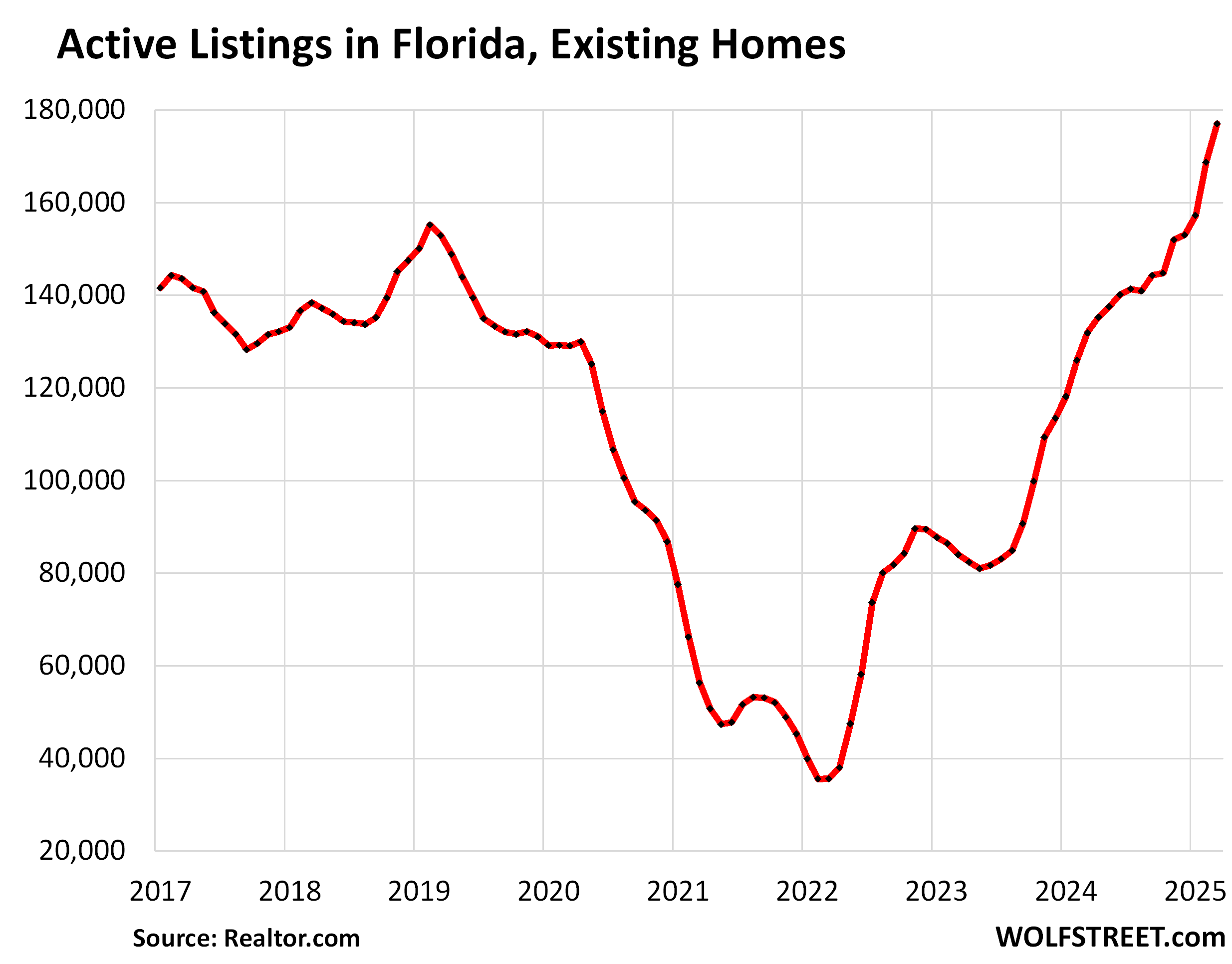
In the Tampa metro (Tampa-St. Petersburg-Clearwater), active listings jumped by 5.8% in March, after having jumped by 6.8% in February, to 18,003 homes, the highest in the data from realtor.com going back to 2016, and up 29% year-over-year:
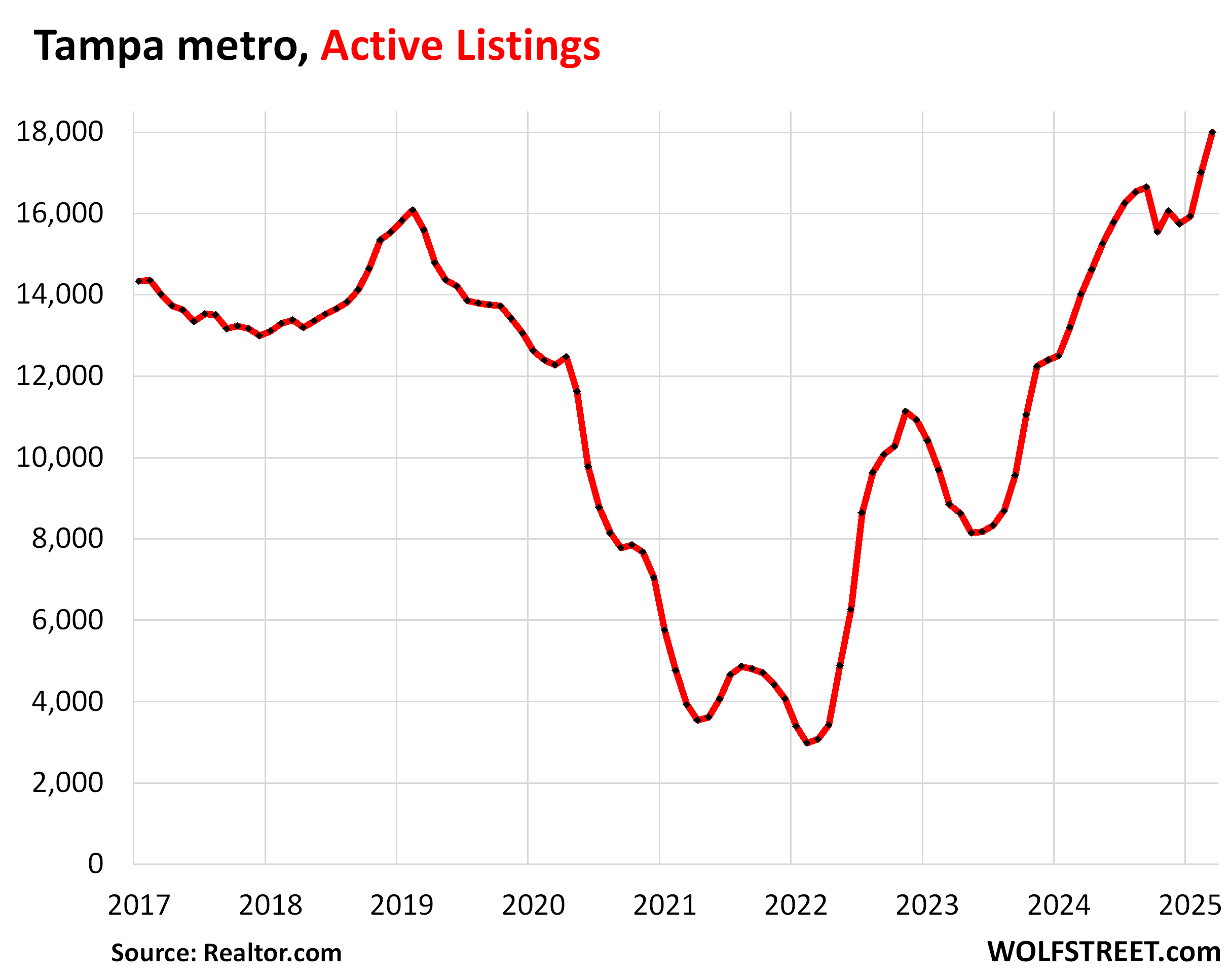
In the Miami metro (Miami-Fort Lauderdale-West Palm Beach), active listings jumped by 4.4% in March, after having jumped by 6.3% in February, to 50,841 homes, the fifth highest in the data, behind only the brief period from January through April 2019:
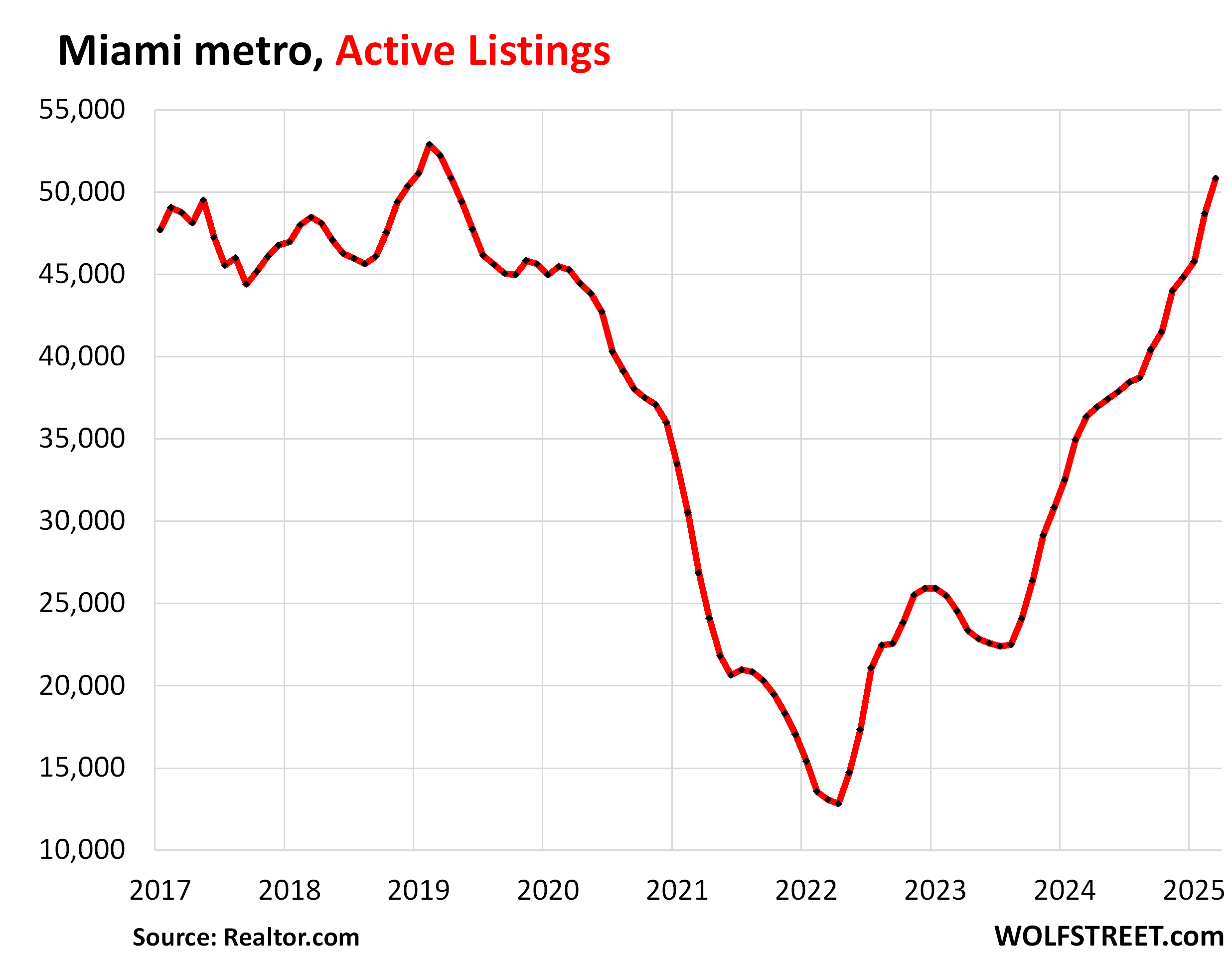
In the Orlando metro (Orlando-Kissimmee-Sanford), active listings rose by 3.9% in March, after the 5.2% jump in February, to 13,287 homes, by far the highest in the data from realtor.com going back to 2016, and up 46% year-over-year:
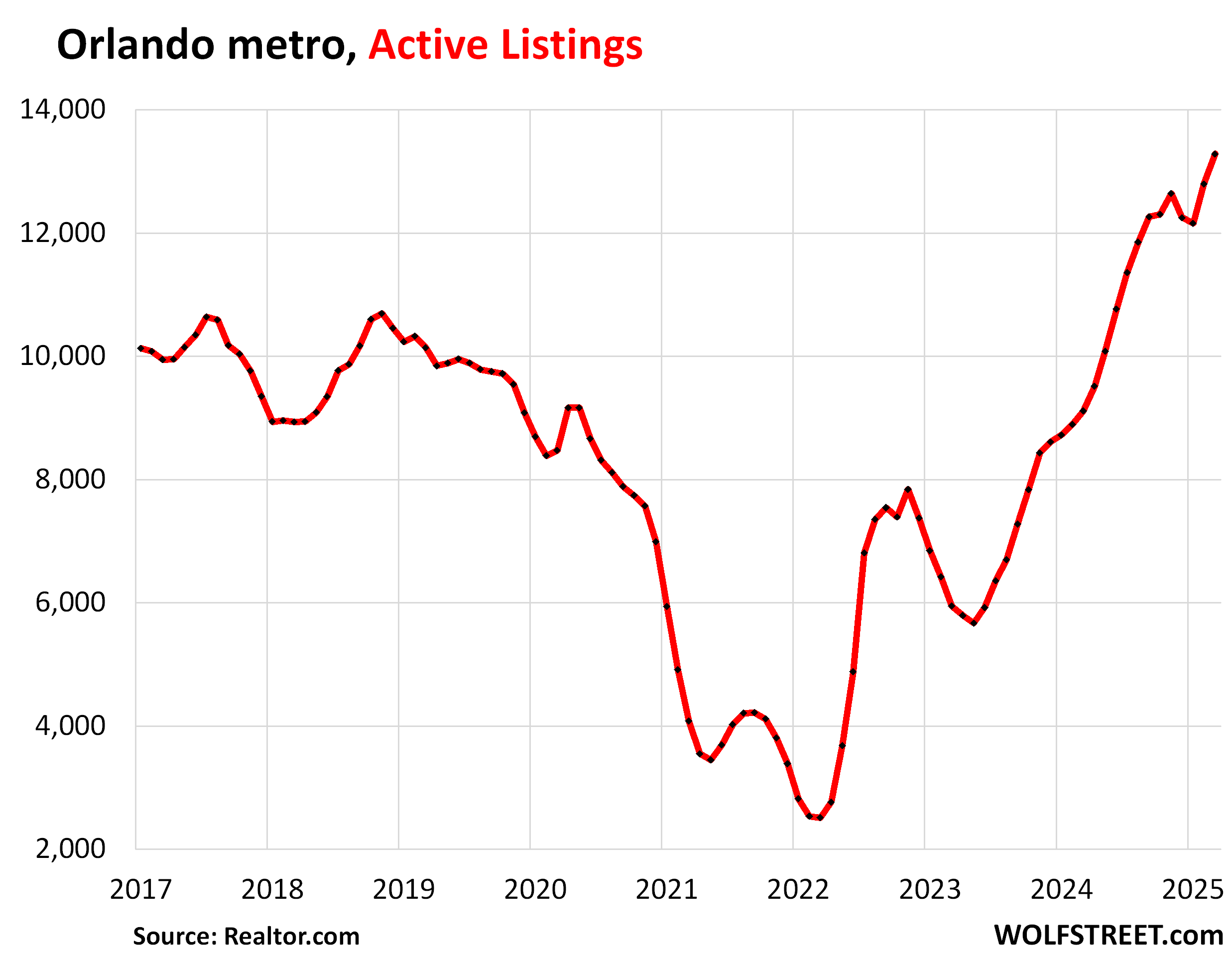
Sellers are climbing off their high-price horse and listing prices have been sagging, both per square foot, and per home.
On a per-square foot basis, the median listing price has fallen by 11% from the high in May 2023, to $367 per square foot. On a per-home basis, the median listing price has fallen by 17% from the high in June 2022. It shows how sellers are grappling with reality.
Listing prices are not sales prices. They reflect prices that sellers hope to get. I will post the sales prices of Miami and Tampa for March, among the 33 most splendid housing bubbles, when the data comes out later this month, but here are the selling prices through February, which have been declining for months for both metros).
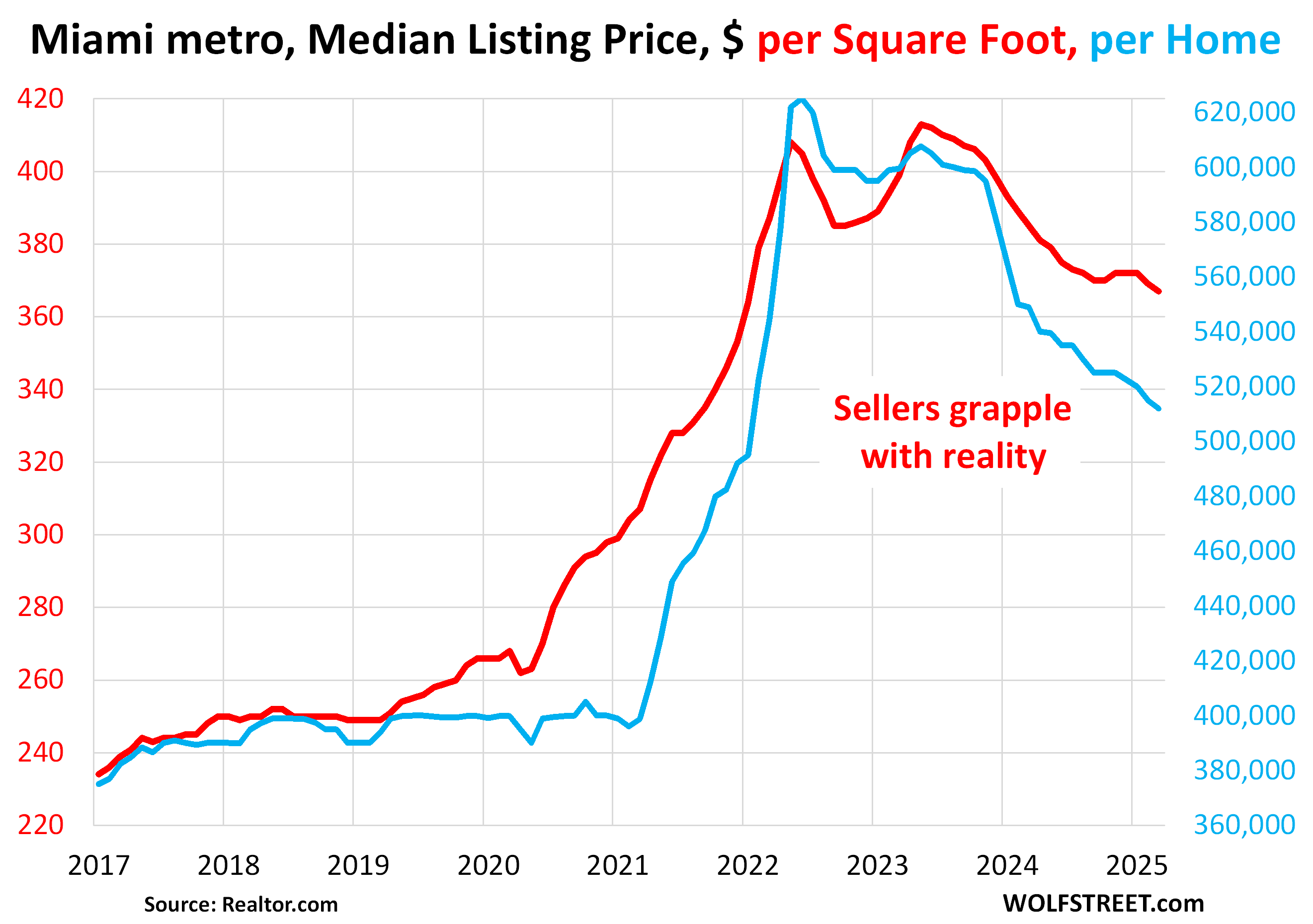
New single-family houses for sale in the South, where Florida is by far the largest housing market, have ballooned past the Housing-Bust high since mid-2024 to a range between 290,000 to 304,000 houses for sale, with 296,000 new houses for sale in February, up by 72% from February 2019, according to Census Bureau data, which doesn’t provide state-level data, only regional data.
Those new houses are adding large amounts of additional supply to the surging inventories of existing homes. Homebuilders are the pros in this business, they know how to move the inventory: price cuts, building at lower price points, large-scale mortgage-rate buydowns, and incentives. And homeowners wishing to sell have to compete with this supply of new houses and increasingly aggressive builders.
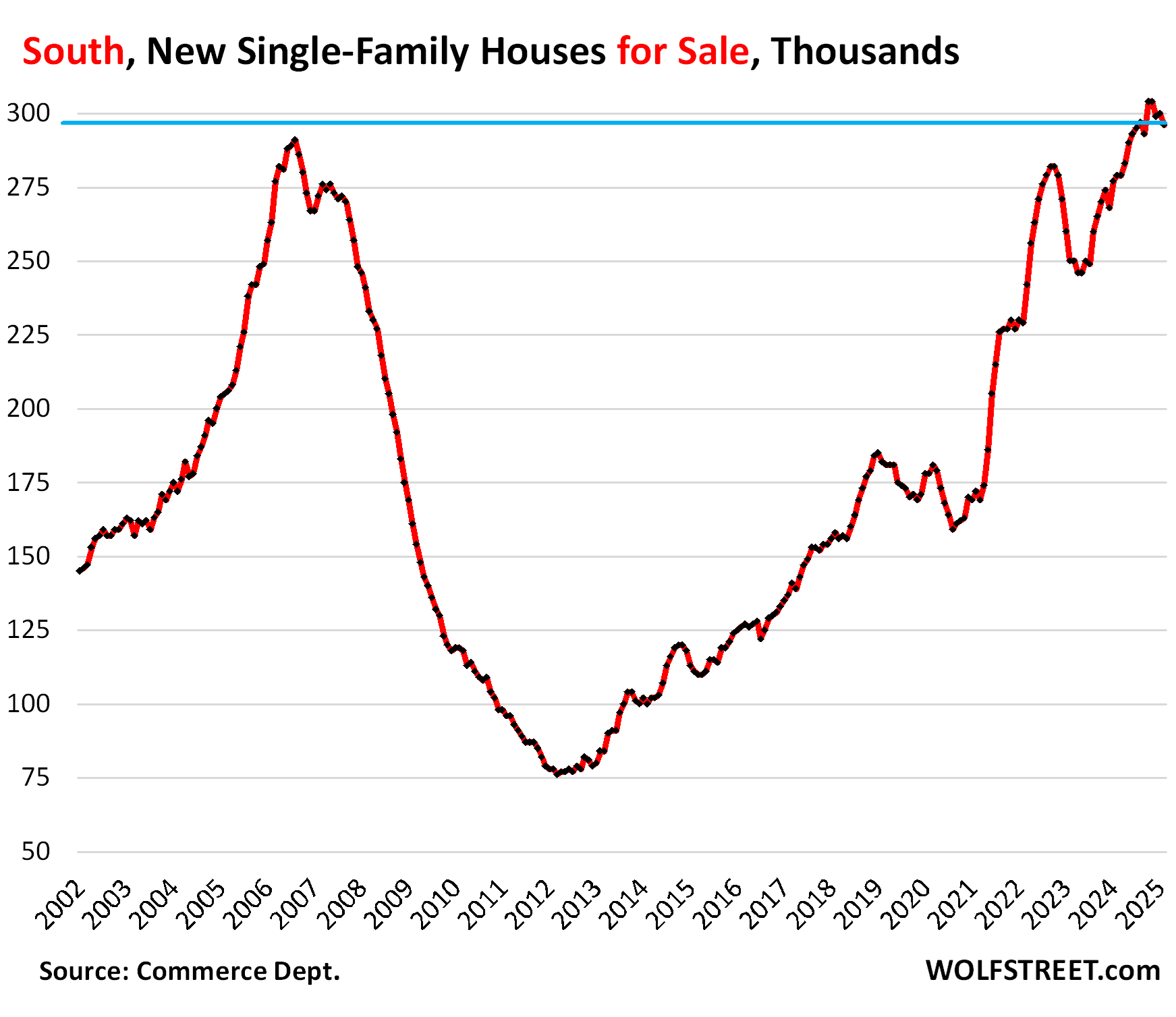
Buyers are still on strike: In the South, pending sales of existing homes rose month-to-month in February, seasonally adjusted, but were down by 3.4% from the collapsed levels February last year, and booked the worst February in the data from the National Association of Realtors. Compared to 2019, pending sales plunged by 29%.
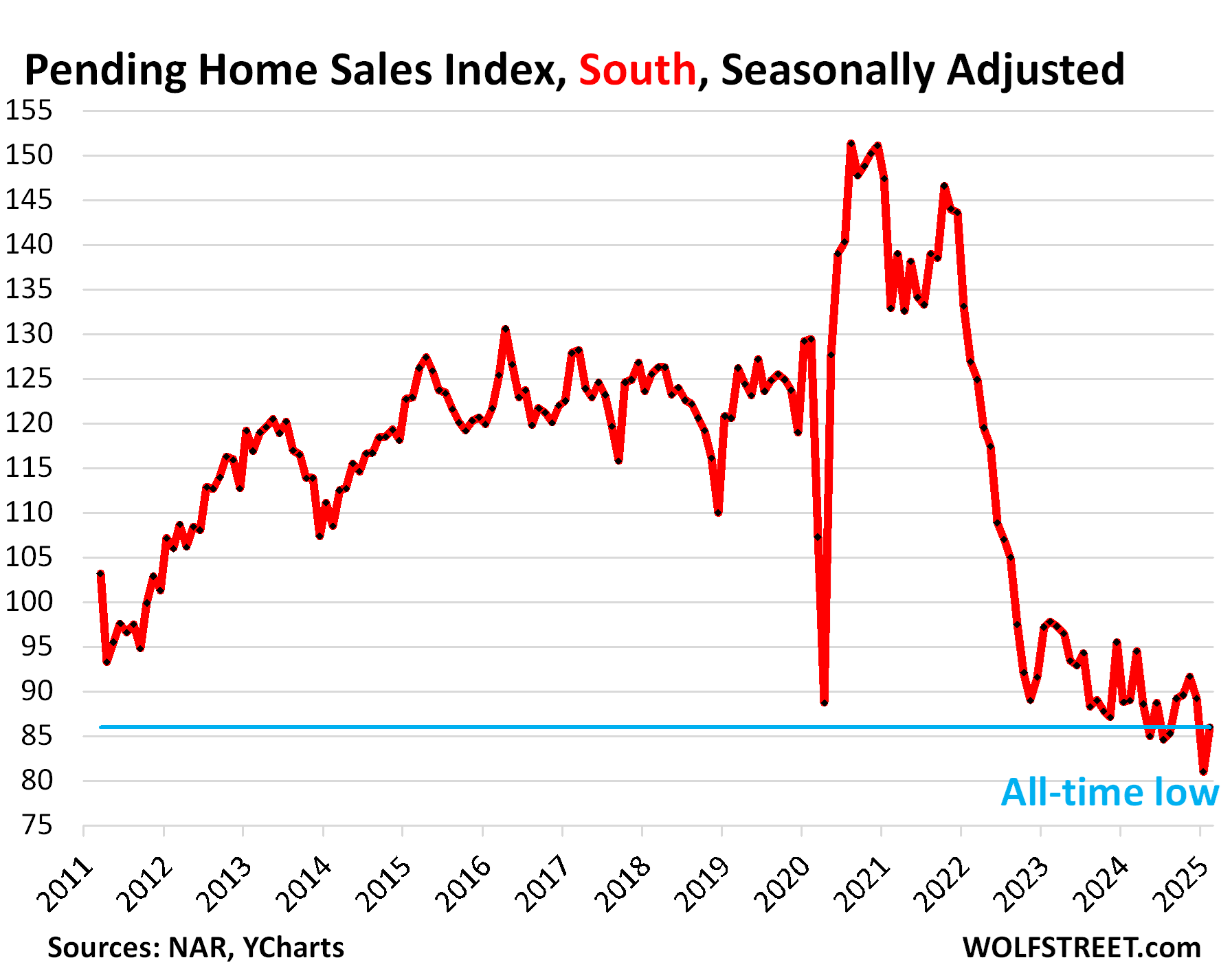
Enjoy reading WOLF STREET and want to support it? You can donate. I appreciate it immensely. Click on the mug to find out how:
![]()


No mention of black-listing of properties.
They’re not even a rounding error. There are 1,400 properties in Florida on the blacklist, out of about 10 million total housing units in Florida.
So in terms of prices, when can we see meaningful price drops? I live in the Tampa area and can say prices haven’t really moved down. You say they dropped 10% but the reality is prices are stagnant. We are seeing a lot more properties on the market however but that’s been the case for at least the last year with no meaningful price reductions.
I look at those prices per sq ft in the chart….they’re already super cheap!
(to a coastal Californian!)
have to factor in 3 things
1) property taxes
2) insane insurance costs IF you can get today
3) hope it’s not OLD condo with $100,000 per unit mandatory upgrades
The sellers who MUST sell will push those prices down until a buyer agrees with the price. This will push comps down, but it won’t happen overnight. Sellers and their agents will still be looking at recent sales from the past year and setting their hopes high. Those motivated sellers are the key to lowering comps.
Insurance costs will kill a bunch of sales as well.
you are correct. the $1 million house sells for $950k, and resets comps. then someone else has to sell, and takes a “lowball” offer of $875k, and down we go.
And don’t forget *panic* as a trigger for cascading price drops.
20 years of ZIRP turned America’s housing market into a leveraged casino (why is it that 50% leverage on highly liquid equities margin lending is considered the province of gamblers…but 80% leverage on poorly liquid SFH is considered just old hat?)
3% mortgage rates (and a ZIRP’ed universe of traditional fixed income investments) lured a *lot* of speculative capital into the secondary housing market – you don’t get a tripling of home prices in the otherwise stagnant US economy post 2000.
Once that speculative cohort panics – more and more inventory comes on the market and prices will go down and down.
And, perhaps given the timing of rapidly increasing SFH for-sale inventory, one could (ahem) speculate on where some of China’s trillions in accumulated trade-surpluses might have actually ended-up via cut-out SFH buyers…
Tampa is very location specific. If you’re selling in Tampa Heights 5 minutes from downtown, for example, things are still moving along without massive price reductions.
If you’re out in Riverview or Wesley Chapel, where it can now take an hour to get into town with traffic and you are also competing with the new builders Wolf mentioned I see sellers already getting creamed.
Location location location.
Reality sets in, eventually.
Black-listed properties are those that can’t get conventional mortgage financeing due to building safety problems.
The news that a rising number of Miami-Dade County condos are included on a “blacklist” of properties that may be blocked from securing conventional mortgage financing and potentially face a tough time obtaining maintenance loans is sure to set off alarm bells in our community. And it should.
How many of these homes for sale are delinquent on the mortgage payments?
If the market continues to decline, there may be even more inventory hitting the housing market in the future. I would suspect that those who bought up homes as investment properties at market peaks also own stocks. At some point, they’re going to need the cash.
Agree 100% here. I give it 6 months or less.
My problem with that scenario is the assumed concept that a decline in housing prices is the last mile given the history of the 1920 through 1940 period.
Deflation is defined as a decline in asset prices while inflation is what I experienced today, a wave of inflation.
Today, my routine purchase, which price was steady for the last seven months, was marked up an additional 10 pct.
I mean, why the hell not take advantage of people.
The current corporate credo.
There is an overhang of aging properties for sale at a price at which price the monthly payment exceeds the demand populations ability to afford such an attractive symbol, a single family residence.
I think it was like four or so years ago, Italy was selling 50 year bonds at a negative interest rate. We have come far pilgrims.
Italy’s 10 year is still being sold at a premium to the US 10 year treasury. The obvious evidence that the macro environment is currently irrational.
” I would suspect that those who bought up homes as investment properties at market peaks also own stocks.”
20 years of ZIRP turned staid home loans for families into bat-shit crazy margin loans for yield-starved speculators…
The Florida real estate boom is over. Florida was never a good investment in the first place. It has always been the subject of boom and bust cycles As a Meteorologist, with a MS in the subject and 12 years experience in tropical meteorology with the Navy and National Weather service I have a special interest in the subject. I wouldn’t touch any properties there anywhere near the coasts as they are one hurricane away from a total meltdown in condo and single family home resale value if they are even left standing. Construction codes were so sloppy after Andrew that an entire 50 mile stretch of South Florida ceased to have any habitable homes. Insurance companies are pulling out of South Florida. I talked to a homeowner there after Andrew who told me his insurance premiums were higher than his mortgage payments. Now they are 3x the mortgage payments.
Andrew was in 92. Update your references… way off!
Joe,
Nothing has changed since Andrew. Cost George H the election
Wrong SC:
In fact, HUGE changes in FL right after hurricane Andrew revealed both the lack of ”rigor” in the codes,,, and perhaps more importantly, the lack of proper enforcement of what codes were in effect.
The insurance industry conducted audits of every jurisdiction in the state, and then paid the politicians to update the codes AND to pass laws providing for severe penalties for lack of proper enforcement.
Saw the results personally as an estimator for storm damages in 2004, with houses built before enforcement of the 1994 codes leveled and next door ones built after OK except for a few roof shingles.
HUGE differences since then too, and more coming as the results of the more recent deadly condo collapse, with many dead, work through the system now.
Meteorologist, Swamp Creature = Starting to make sense now. 😉
Yeah, you have to be really dumb if you invest in Florida coastline in 2025. It’s doomed.
Almost just like 1926!
Another 1900 Galvenston is just one hurricane away.
There was no early warning system when Galveston was hit in 1900. and the place is thriving now, 124 years later!
Anthony…an early warning system doesn’t magically empower you to teleport your mortgaged house somewhere else.
Insurance companies know this…that’s why FL premiums are as high as they are.
And…until you have actually tried to get an insurer to fully pay off on their policies…well. let’s just say, you’ll be in for an eye-opening experience.
Cas:
Have pet insurance and filed a claim about three weeks ago.
Took them a week to reject the claim even though the problem was specifically stated in our policy.
I called them, told them that it was covered, and appealed their decision.
On Friday they stated that in fact the problem was covered by our insurance policy and yesterday they paid the claim
Had I done nothing we would have been out of pocket a huge amount and this was the first claim we had.
Been paying in for 11 years too.
SC, this is garbage. I’m a native 4th gen Floridian. Homes within a few miles of salt water rust because of salty air. Happens everywhere there is salt water… Pretty much world wide.
Rich people that live along the coasts of every state can afford to keep up with the extra maintenance. But the posuers who can’t, get into condos / houses that take their deferred maintenance and spend it on landscaping.
Then a storm comes along and makes a mess. Some worse than others. But there is not and never was not and never will be a 50-mile stretch that’s uninhabitable.
For evidence I offer the Mara Lago seawall that fell down into the intracoastal some years back. Ol’ boy tried blaming it on airplanes. I personally drove by that place no less than 6-times a day, sometimes more. If you don’t do maintenance, like was never done there on that wall, as evidenced by the cracks in it at the time, then 80-year old structures tend to fail.
This isn’t rocket science or meteorology.
He was sort of right after Andrew. Almost everything south of Cutler Ridge was, if not destroyed, it was pretty close to it. Florida City (right next to Homestead) was gone. Admittedly, very poor area with less than wonderful building construction. We had been living in Homestead until 1990 — two years before Andrew. And building standards were very lax in those days with ‘drive by inspections’ being common. We drove through the area in November three months after Andrew. It was devastated. After Andrew the building codes changed and inspections are much more rigorous. And that uninhabitable stretch now? Completely rebuilt and much pricier than it was back in Andrew’s day. No doubt insurance is expensive, but then it should be.
My daughter and her husband live on the west-central coast just north of Tampa. I don’t know what they pay for home insurance, but it certainly isn’t crippling. They do live a few miles inland (east of 19). When we moved back to Florida in 1997 when the kids were young we lived just north of Tampa as well, though about 20 miles east of the coast (Wesley Chapel). State Farm wouldn’t even write a policy the first year. After that they started writing a few policies and we got in with them.
We moved an hour north in 2015 when the kids left home. When we bought the house in 1998 you couldn’t even get a pizza delivered. When we go back down there now we can’t believe the zoo it has become and are so glad to see it in our rear view mirrors as we head home!
not to mention that the houses that were built to withstand hurricanes, with impact glass, and properly done roofs, survived ian just fine.
if you choose to live in a poorly built 70s house right on the water, well that’s on you.
Buying right now in Miami Beach will yield a payment that is 2/3 mortgage and 1/3 T&I for a “typical” house ($1-$3m)
Another meteorologist here in the private sector (aviation & energy markets). Love to see the met presence on Wolf’s blog. And I agree – I wouldn’t touch coastal FL housing properties with a ten foot pole.
…I still worry about the number of Prof.Lysenkos wandering about at our current Politburo’s level…
may we all find a better day.
I’ll believe it when I see it. Florida’s housing was overpriced to begin with given the issues you pointed out. Then there is the fact that there are a whole lot more Floridians than there used too be. Since they are often suspected as being nuts the population increase, increases the impact on society as a whole.
Hey Wolf,
Any thoughts on Jacksonville’s market?
I’m hoping to buy my first home, but not at these insane prices.
Sincerely,
Dylan V
I’m not commenting at all on your idea of buying a home in Jacksonville or elsewhere. Just generally, as rule of thumb, if the wife says it’s time to buy a home, it’s time to buy a home.
Just note that Jacksonville figured in my list of the biggest price drops for condos, -10% from the peak so far through February:
https://wolfstreet.com/2025/03/21/where-condos-already-came-unglued-10-big-cities-with-price-drops-from-10-to-22-from-peak/
And just imagine what the monthly condo assessment chart looks like…
It always amazed me what con men can get away with using two steps…where one step would never work…(see also, government…)
Based on the peak to trough in Housing Bubble 1, the bottom of Housing Bubble 2 would be around $93,000. (60,000 divided by 135,000 = .44. 210,000 times .44 = $93,000). Sounds about right. As for timing, peak to trough in Housing Bubble 1 was five years. The Peak in Housing Bubble 2 is around 2023. So the new trough would be around 2028. So buy a house in Jacksonville for $93,000 in 2028. It would be nice if was really as predictable as this sounds.
I just checked a hurricane risk map and SW Florida looks like high risk.
The Canadian way of increasing property values is to give millions of study permits with unlimited work hours like candy. That way there’ll be an endless supply of “students” paying rent living 10 to a bedroom.
Even the hurricanes wouldn’t stop that.
Well, (snark) Canada is hugging Stalin’s bear with their socialistic health care system and other initiatives which are currently under attack by the government that they elected.
The end of ” a free lunch ” ? I’m not sure that Canada isn’t a worthy investment.
More crying from the guy who doesn’t own any real estate. Like man, you could have been whining like this for the past two decades, or you could have bought one or two properties back in 2017 and doubled your money by doing absolutely nothing. Canada remains a global safe haven. What how the world flocks to us once Carney is elected.
I wonder if the Canadian demand for FL has dried up.
Travel demand between the US & Canada is down 70%.
Yes. It’s in the news.
There better be more homes for sale and being built in Florida in 2025 than in 2016 as the population has increased by over 3 million people during that time.
If there are more people, then there should be more buyers, no? It’s the buyers that have left the chatroom, while the sellers are crowding in, LOL.
Add in that used homes are relatively high (if not higher) to new homes with latest code and style/features.
Buyers will start expecting a discount on old homes more, at least the structure.
>new homes with latest code and style/features
Lol, just came back from Home Depot looking for some proper HVAC sealant, as it turned out HVAC guys who were hired to install the A/C by the builder of my “award winning” house “built to the latest code”, cut every possible corner and used the cheapest materials that exist in the universe, even if they are not suitable for HVAC. So much for the modern style/features…
I slowly start getting what my plumber friend meant when he told me he was not considering new builds in NC/SC at all, only houses built around 2010-2015…
i agree. good new homes in good locations and a good price will almost always win over older homes now.
IN – code is shorthand for “worst structure you can legally sell”.
Well with the population increasing by about 400,000 people a year they are going to have to live somewhere, aren’t they?
If the average household is 3 to 4 people then that population increase will take at least 100,000 homes off the market.
New houseboy formation will take more.
Check out new-house inventory, and new-apartment and condo-inventory. There has been huge growth in new construction, single-fam and multi-fam over the past few years. It’s funny how people always forget that construction is a huge part of the US economy.
I live in Egypt, the population increases by 100,000 every month. Housing is the ultimate safe haven.
Immigration has gone down drastically and birth rates are falling off the cliff in USA. On top of this, Over time, homes per person in the US has steadily trended up.
It is interesting to see that some of the hottest housing markets e.g FL, Austin SFO etc are going down in price even without recession/job losses.
Think what happens when the recession starts and job losses pile up?
I guess STR investor would be the first to exit.
I know being on strike is just an expression but I wonder how many are just financially priced out versus choosing not buy at these prices. My guess is quite a few as between much higher mortgage payments, taxes and insurance the pay check gets mostly eaten up with that
Howdy Glen. Glad you asked the question about being priced out. There are millions of Prisoners with low mortgage interest rates. USA ZIRPed them. The housing bubble create by Govern ment continues to hiss. Pray it does not POP……
Patiently waiting for a pop here.
Howdy SOL. The Housing bust 1 was awful and Govern ments cure was worse than the POP. I truly fear for a second RE POP and fear even more, what Govern ment might do next…..
DFB
There are EVEN MORE folks with PAID OFF homes.
Are they prisoners as well ?
Howdy O T B Not if paying cash. Hope that helps.
It doesn’t matter. Prices are way too high. As simple as that. They shot up 50% or whatever in a couple of years, after already being inflated, and they’re now way too high. Much lower prices will heal the housing market.
i agree. after watching home values for the last few months, there are just SO many homeowners who keep hoping prices will go up forever and all they need to do is wait for that 1 buyer the show up and pay the outrageous price. Even when homes that do sell end up dropping 20-30% in order to sell here in Texas. Too many homeowners in the U.S. truly believe the “Home prices always go up forever” until they are forced to sell.
Most of the people I know are financially priced out. People are still having the mind set that real estate is the best investment but they just can’t afford it at these price levels.
Hi Wolf,
You may have written about this topic but I don’t remember reading it.
What percentage of homes in the US are purchased with a mortgage and how many are purchased in cash?
About one-third currently. The ratio is up as people with money invest their own cash instead of borrowing at 6-7%. It’s like a guaranteed 6% return. Makes total sense.
Guaranteed, risk-free, AFTER TAX return of 6%. Even better!
SW Florida home prices peaked in the summer of 2022 and have been falling ever since. There have been two big hurricanes since then (Ian, Milton) and several others that scrapped the coastline (Idalia, Debby, Helene). I live four miles from the coast. My flood and property insurance is $3100 per year. My home is concrete block construction with hurricane windows and sliders. Ian and Milton damaged a lot of homes where I live, but mine, by the grace of God, did not flood or leak.
Those who have lived in Florida for a long time accept the inevitability of hurricanes. As for people leaving in mass due to hurricanes and falling home prices, I don’t buy it (not yet at least). You can still get more for your money in Florida than in Colorado (where I left a few years ago). And if my home declines in value, it doesn’t matter. Maybe my property tax bill and insurance bill will go down? And if I have to move, I sell here and move to another lower priced property.
During the winter, I can swim in an outdoor pool. I can go for leisurely walks on the beach. I am in shorts and t-shirts nearly year round. I don’t shovel snow. That’s my kind of life – but it’s not for everyone.
Homes are places to live, and not “investments” in the typical sense. Buy what you can afford and where you want to live and quit worrying about the market.
Best comment of the bunch.
-50% down in prime FL, and Gattopardo finally gets that Miami Vice pad he’s always wanted….
You mean live on a boat with a pet alligator named Elvis? That would be living the dream!
… don’t forget driving a Ferrari. Best of all it’s all paid for by the taxpayers. And don’t forget to include the golden retirement plan. A lifetime paycheck regardless of performance and qualified immunity.
I have a friend in Orlando who says the same. The impact in Florida is all the investors who bought Airbnb properties that no longer deliver the expected returns, those investors were happy to ride the price increases up, but the exit signals are flashing. If one was planning to get out, the time was last summer.
not just airbnb, but “remote workers” who have left, out of choice or necessity.
any place that was nice to live, or seemed nice to live, but cheaper than new york, san francisco, d.c., l.a. and so forth, blew up during the pandemic as prices reset to those places. that’s coming undone.
Totally agree. I’m in Colorado and am a mountain person, but I get the appeal of the beach lifestyle and zero state income tax. FL will continue to grow, especially in the areas that are less expensive. Prices there got bubbly for sure, and a correction is a good thing.
Then, it’s all a tempest in a tea pot, what your saying. Only the namby pamby New York transplants are fleeing. Real Floridians are shrugging off what happened to someone else.
I don’t believe that’s the case, I guess I might find out when I’m there next week. I’ll try to ascertain the facts about the buying behavior of Floridians,
1990s , 2008 all over again. Amazing. Fred Foldvary was right.
Cash is king. Keep an eye on the LOCs soon they will be locking them down.
I sense that the stock market has retracted past the point that levered investments begin to buckle,
The theme for tomorrow. Margin Calls,
Seeing the increase in the monthly mortgage payment due to the Feds return to a normal low interest regime was the beginning of this real estate stagnation. Now further uncertainty will do much more damage. Those inventory numbers only have two solutions. Lower price or yank it off the market.
We have all been here before. A decade of inflation, or a slump. Have to sell, welp, find a price that the buyer can do.
The macro economy is always reflected in those animal spirits. Buy or rent based on your needs and how long your term is going to be.
Watch the Marx Brother’s movie ‘”Coconuts”. It about the real estate bust in the 20’s. Nothing changes except the faces.
As a resident of Miami Beach, properly priced properties sell within a month. However there’s a mentality that lists most properties at 10%+ over fair price and those properties linger until they cut prices to “normal” for now which is about $600-$700/sq foot for a “typical” SFR/townhouse or $450-$550 for a typical condo. (No special amenities etc)
“properly priced properties sell within a month.”
1. yes, not in my neighborhood, of course. Miami metro median days on the market before the homes got pulled off the market or before they sold was 67 days in March (realtor.com),
2. You can sell anything if the price is low enough.
Yes, as I stated, most sellers are still trying to find a gullible Canadian, Russian, or West Coast refugee from Communism. In my hood, a house priced at a reasonable $1.45M for 2100 sq ft, updated with new pool sold in 2 weeks. A similarly priced 1500 sq ft with no pool has been on the market for 7 months.
As your chart shows above, we’re rapidly getting to the point where $/sq ft is lagging inflation since 2020, if we haven’t already.
I hate to say it, but between DOGE and trade wars and deportations and super low consumer sentiment and crumbling stock prices creating a negative wealth effect and private sector layoffs, the long awaiited and overdue recession will finally arrive.
Trillions in printed money delayed it, but can’t put it off forever.
Recession equals lower interest rates and at some point lower mortgage rates and lower home prices will end the buyer strike.
I agree with you.
But the time it will take before this list from A to Z is realized is unknown. It could take a long time, or it could pass in an instant.
Employment and liquidity will stretch this out indefinitely.
Once investors and speculators start to sell, it will jump into an even higher gear. Overall yields are very low.
The rejected politician turned perpetual housing bear Garth Turner mentioned your graphs from this post
Woulda been nice if:
1. He hadn’t just stolen my chart (copyrighted)
2. And if he steals it, woulda been nice if he had at least attributed it to Wolf Street with a mention and a link in the text. No mention in the text of where it came from.
To come and think of it, did Gartho just downloaded the graphs from here and uploaded it on his blog post as his own? That’s considered plagiarism in high school!
Posting the chart without permission was not plagiarism. It was the far more serious legal issue of him violating my copyright. Everything on this site, including charts, is copyrighted, as it says at the bottom of every page. You cannot republish my charts without asking me for permission. I could in theory sue him, and I would win because copyright laws are fairly clear and draconian to discourage it. There are law firms that specialize in going after copyright violators on a contingency basis.
Adam Taggert frequently mentions you and your thoughts.
Adam has my permission to republish my charts occasionally. And he also always attributes my stuff to me.
Over here on the Space Coast, the number of higher end apartment complexes that have been built & many more that are under construction must be a sign. Sell your house & rent.
Over here on the Space Coast, the number of higher end apartment complexes that have been built & many more that are under construction must be a sign. Sell your house & rent.
Is Floor-Ida going to be the epicenter of the real estate quake felt round the world? The mother of all quakes; the Big One?
Likely just a transitory adjustment like back in 1926 which turned out to be an incredibility great buying opportunity!
It is all good! Lots os good areas in Florida, if the price is right and you can self insure.
I would love a place North of SF. One good shake, is all it would take.
Most areas carry some risk and every year is not a winner. It seems too many don’t understand that. A long recession could give them the education they need.
The Florida panhandle is the best place on earth.
DM: ‘Black Monday 2’ fears rise as stock futures sink sharply again as Trump tariff fallout escalates
Fears are growing that Wall Street is about to see Black Monday 2 tomorrow – which would make last week’s sell-off caused by President Donald Trump’s tariffs look tiny.
Trump’s people seem to be pretty consistent about this going on for some time. If that’s the case, I expect another ~15% down on top of the ~10% from last week and 4-5% on futures as of now. What will that do to real estate, particularly in areas that have seen ridiculous appreciation? It seems like that could snowball through the mortgage holders.
the freaking out on the times, wsj, and washington post comment sections about the stock market is really hilarious. these sick people truly do people they’re entitled to 25% returns every year, because “stonks only go up.”
There are other issues with Florida besides the bugs, heat, humidity, crowding, RE taxes and insurance rate madness.
Of interest to many observers is the fact that in order to slow the salt water intrusion under coastal cities and into their water supplies they are flooding the Kissimmee river valley. This river flows through central Florida and has been restored to a winding course and no longer drains the land as the Army Corps of Engineers intended.
The flooded land holds heat, a lot of heat. Hurricanes love the hot water lying on the land. Instead of losing strength when they come ashore, they can maintain themselves or even strengthen (under the right conditions).
Love Florida or not, it will be the scene of multiple hurricane disasters in coming years. If you have not been in a category 4 or higher strength hurricane, it is hard to understand the power and destruction.
Living in Florida is simply roulette.
Rule of F’s – – – If it Flys, Floats or is in Florida? Rent It!
I could not disagree more with your comment.
Just because the Army Corp did something back in the day, doesn’t mean it was the right thing to do or the way it’s supposed to be. The Army Corp completely ruined Lake O and did their best to ruin the Everglades by channelizing the Kissimmee River like it was the LA river, and disturbing all of the dynamics of the unique ecosystem (the Everglades ecosystem is unique to all of the Earth).
Restoring the Kissimmee River to a natural path has been a great environmental success with a return of bird populations and wild grasses to the native prairie. Lake O is getting better but still has a long ways to go to cut down on the polluted releases to the St Lucie and Caloosahatchee.
As for a hurricane strengthening because of the Kissimmee River going down it’s natural path, get real… Even if that were true, it’s not a reason to destroy the entire ecosystem of Central and South Florida.
I was not commenting on the environmental aspects of the restoration. From an environmental perspective it has been a great success. More importantly, it is helping the aquifer of coastal Florida as designed.
Good environmental policy and hurricane management are separate issues. The largest issue is the overpopulation of coastal Florida is at the center of both issues.
If you go back in history relative to storms actions once they go inland, you will find that before the valley was partially drained there was a hurricane in 1928 that ranks as the 2nd most deadly in U.S. history. An estimated 2,500 people died when the dykes around Lake Okeechobee failed when the storm continued at Category 4 strength after coming inland (due to the hot water on the land.
A more contemporary storm to consider is Wilma in 2005. When it came ashore on the west coast of Florida with winds of 120 mph it was predicted to be down to 85 mph by the time it reached Stuart, FL. Instead of weakening, it strengthened and hit downtown Jensen Beach with winds of 137 mph. The historical Town Hall was flattened. I was in surgery at Martin Memorial when the elevator shaft doors failed and water flowed down through the hospital. The ceiling in one of the operating rooms fell in while we were replacing a broken hip. There is no way we would have even been doing that case if the weather service had accurately predicted what the storm would do.
Keep in mind that the land was flooded from the previous hurricanes Fran & Jan. Hot water on the land was credited for the reason the storm maintained its strength and finally strengthened.
Yeah Wolfman, at least the Florida panhandle is faring a lot better than South Florida and Tampa.
We live in interesting times. I keep seeing straws being piled on the economic back of the US economy, and rather than slumping, the camel just keeps stiffening its legs. The correction, when it comes, may come with the snap of a rubber band breaking.
“You hear that, Mr. Anderson? That is the sound of inevitability”
Of course, everyone talks about hurricanes in the east, but the elephant in the room is the big earthquake coming to the west coast. It isn’t a question of if, but when. The US real estate market is operating on borrowed time.
6:37 AM 4/7/2025
Dow 36,908.57 -1,406.29 -3.67%
S&P 500 4,869.12 -204.96 -4.04%
Nasdaq 14,902.29 -685.50 -4.40%
7:22 AM 4/7/2025
Dow 38,393.83 +78.97 0.21%
S&P 500 5,128.72 +54.64 1.08%
Nasdaq 15,842.98 +255.20 1.64%
Folks, you gotta look at the time stamp of these two stock market level comments by SoCalBeachDude. He is on Pacific Time. So 6:37 AM = 9:37 AM Eastern, 7 minutes after the market opened. 7:22 AM = 10:22 AM Eastern.
At 10:30,AM the S&P 500 was again down over 1%. And it may turn positive again, or more deeply red, or whatever, in the next five minutes.
These are HUGE swings, from -4.04% to +1.1%, to -1.x%, to plus x% in a little over an hour.
10-year Treasury yield spiked by 14 basis points by about noon Eastern, end of fear-trade? These markets are making brutal movements.
The market crashing, and 10yr yields plunging as investment capital flees to safety is the best thing that could happen for the Real Estate market as inventories continue to stack up.
Someone needs to tell Trump to stop pressuring Powell to save the stock market by lowering Fed rates. He can’t have his cake and eat it too.
More affordable homes and mortgage rates, and lower inflation rates, OR a sky-high stock market with higher inflation rates, that is the choice.
The vast majority of voters would unquestionably favor the former option.
1. “and 10yr yields plunging…”
By noon today, the 10-year yield has spiked 14 basis points.
2. the way home prices come is through historically normal mortgage rates in the 6-9% range. Repression of mortgage rates CAUSED home prices to spike, and these way-too-high prices are the main problem the housing market has now.
10-years are up .219, back to April 2 levels. 20 years are up .263, higher than April 2 levels. These are amazing one-day jumps.
Algos and idiots – the markets are just games played on a computer now.
Thanks WR,
We need similar story in CA.
I am sure, it’d come in due time.